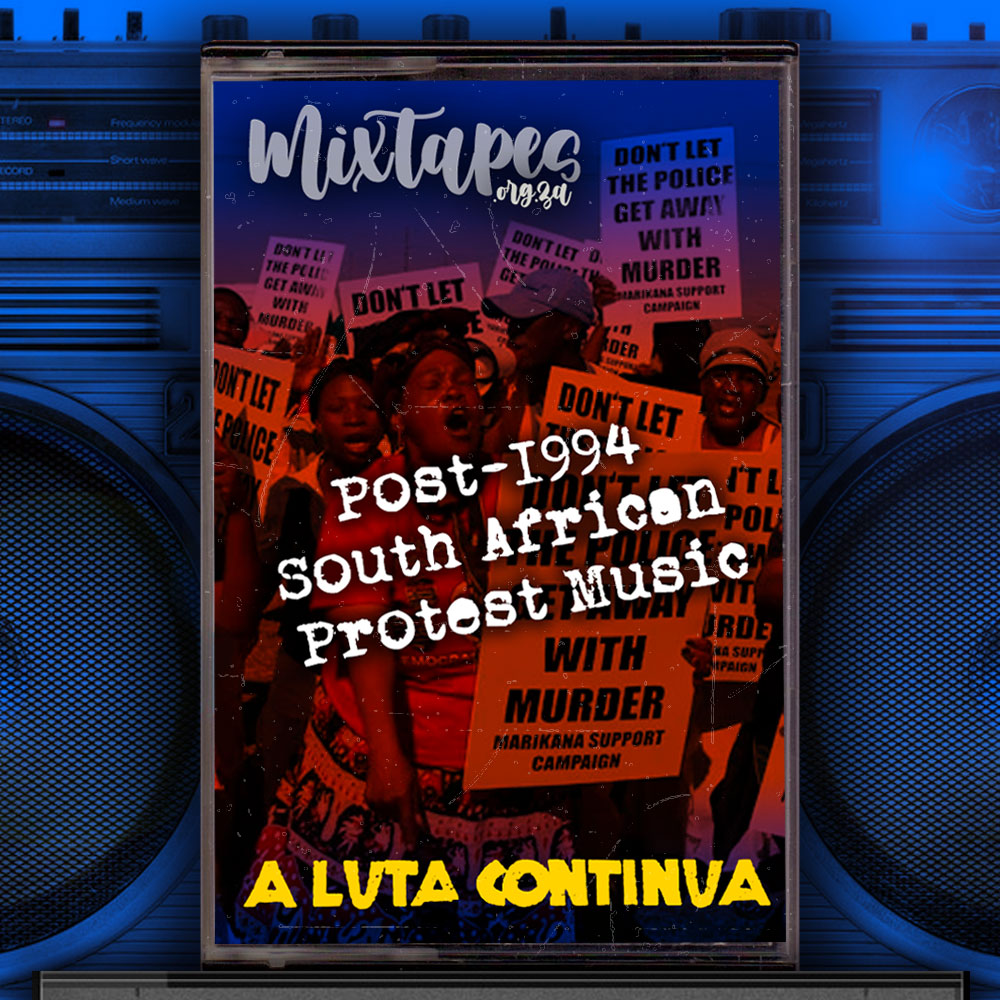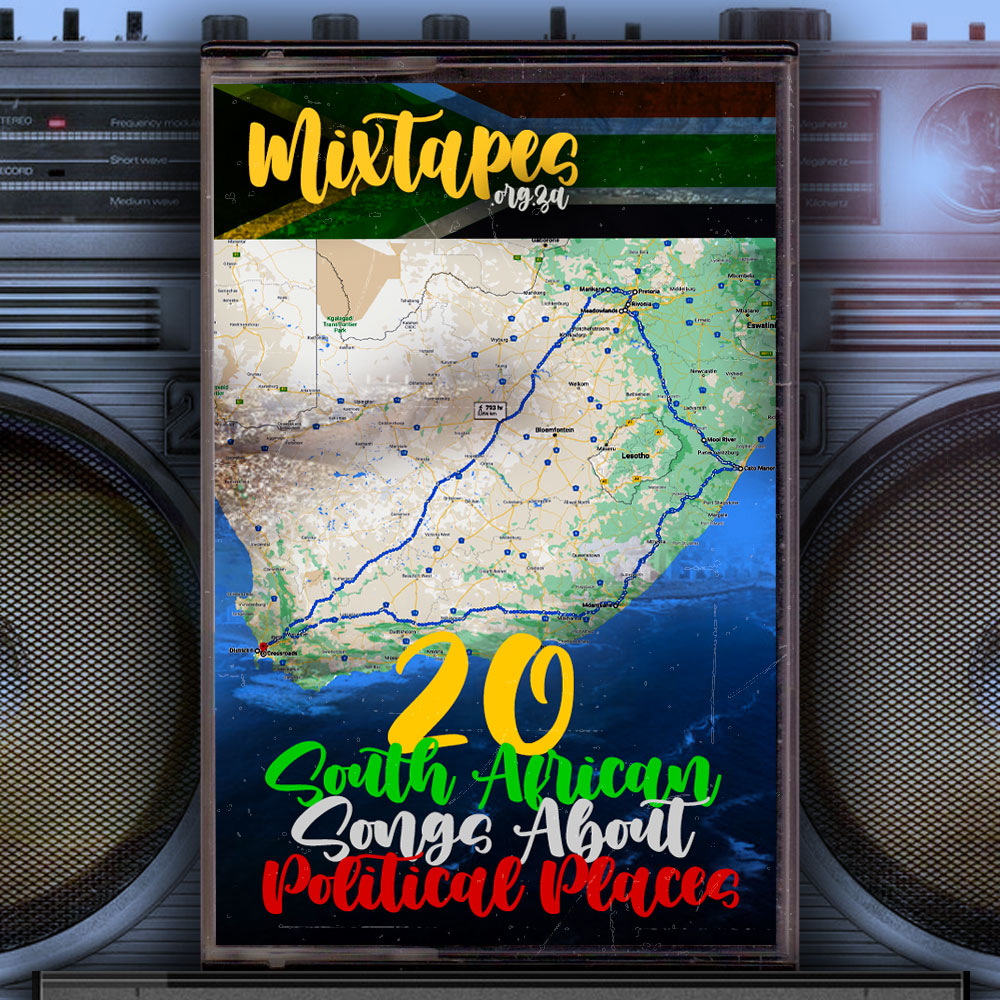
This week marks the second anniversary of mixtapes.ZA. To mark the occasion we have put together a mixtape of post-1994 protest songs, reflecting on how popular musicians have continued to speak out against injustice, despite the toppling of the apartheid government.
South African protest music against the apartheid system is well documented and has been featured in various mixtapes over the past two years. When, in 1994, the African National Congress came to power it was hoped that there would no longer be a need for protest music against injustices. However, extreme poverty and government corruption have continued. As the gap between the rich and poor grew, and public infrastructure deteriorated, some musicians began to protest the ongoing economic inequalities and government corruption through their music. Others also protested the relentless violent misogynist attacks against women which characterize life in South Africa.
This mixtape features a selection of music from different genres which tackle a cross-section of injustices. While there is some debate about what constitutes a protest song, for this mixtape we have selected songs which voice opposition to an injustice. Sometimes the songs are angry, other times they are mournful, and on occasion they are even humorous, when musicians use laughter as a weapon against injustice.
After the initial euphoria that came with the ending of apartheid, musicians began to voice concerns about greed and self-interest in the ANC government. In their 1998 release, “Put Off Saving The World”, Dorp tackled the problem of greed, both in society generally and within the government – “We’ve got inside information; On government masturbation; Don’t need no explanation; To come to a conclusion; It’s a fuct up situation.”
This situation worsened and as the early 2000s set in, service delivery was failing, infrastructure was falling apart and corruption was spreading. In “Potholes And Politicians”, Fuzigish drew a direct connection between government corruption and failing infrastructure: “On my way back home I hit another pothole; The government’s corrupted, the constitution is ill; All I seem to do is pay another bill.” While The A. K. Massive reflected that government lies and corruption put paid to dreams of a better future: “Ahh corruption! No more lies … In a country that teaches you to reach for the future, but be satisfied with less …” Similarly, in “Die Stad Bloei Vanaand”, Johannes Kerkorrel agonizes, “the dream was promised, but just another lie has been sold.”
During the Zuma years government corruption in the form of state capture was so appalling that Freshlyground called South Africa a “Banana Republic”:
All your people dying in freedom
Suffering a profound lack of leading
Are you even there when we call?
Are you a human, man?
Full of lies! Can’t believe what I’m hearing
From your lips a river of scheming
Poisoning all the water we’re drinking
Are we good to go?
Emergency
Discovery
No opportunity
It’s just another day in the Banana Republic
State of emergency!!!!
Freshlyground’s reference to the current situation as a “State of Emergency” especially rankled ANC supporters because it effectively compared Zuma’s abuse of power to that of the apartheid state, who tried to hold on to power through the declaration of a series of States of Emergency in the mid-to-late 1980s. Simphiwe Dana similarly draws a comparison between the two eras – in “State of Emergency”. She protests the way conditions in post-apartheid South Africa mirror the conditions facing the youth of 1976: “Only poverty reigns in our streets”. Lilitha’s “Marikana” also stands as a comparison between apartheid South Africa and the current ANC regime: this time miners shot dead by the new South African Police Services, defending the interests of mining capital.
Johnny Clegg’s “Asilazi” is “about an ordinary person who has to give up power to guarantee
their place in an uncertain tomorrow and the chorus is about those who have been waiting for
so long for this change to take place” (Johnny Clegg). While in “Zabalaza”, Thandiswa
Mazwai considers how those people waited in vain. She laments the state of South Africa and
asks how these atrocities can be happening in her father’s house, suggesting that the
government ought to be the father of the nation, securing everyone’s needs: “Why is it this
way? At my own father’s house; For their blood, sweat and tears; For their struggle and pain;
’Cause they gave up their lives for this.”
“Skunk Atavistic” by Lesego Rampolokeng & Kalahari Surfers is a stream of consciousness type dub poem with moments of bitter protest such as “Amandla for what? Not a fist you are clinching; It’s your sphincter.” Meanwhile in “Politics” Skwatta Kamp overtly and angrily protested the failure of the ANC government to deliver a better society to South Africans:
To me political parties are like escort agencies,
Those that fuck around the most get more money.
Of course they work hard to make their own pockets fat.
They don’t give a fuck about you and me it’s all an act.
Call me ignorant but I know my shit, I got direction.
Why the fuck you think I don’t take part in these elections.
Flabba signing out A-N-C you later.
Skwatta Kamp people’s thoughts are always greater.
Karen Zoid and Kaalvoet Prinses address the most appalling feature of South African society: endemic sexual violence against women. Zoid sings “Justice! Justice! Lock up all the rapists and thrown away the key” while Kaalvoet Prinses (Tremaine Barnes) who champions the Barefoot Campaign which supports victims and survivors of gender based violence, also protests violence against women with her call to action: “Women gave birth to this human race; And a new born girl gets a can of mace …”
Some musicians have used satire, irony and humour to critique human rights abuse and corruption. Witty and biting criticism is able to ridicule those in the wrong, and the subsequent laughter signifies moral triumph over the wrong doing.
In “Die Fokkol Song” (“The Fuck All Song”), Koos Kombuis makes humorous use of the term ‘fuck all” to ridicule and protest the government’s inability to provide South Africa’s basis needs. The song was released prior to the 2010 Football World Cup, and he introduced the song as though it was a welcome message broadcast to tourists arriving at the airport:
“Welcome to the airport, it’s the year 2010, I’m assuming you’re here to watch the soccer games. We finally have a chance to show the world our friendly democracy, so make yourself at home.
Fuck all petrol, Fuck all diesel, Fuck all TV, Fuck all power, Fuck all water in your whisky, Fuck all jokes to laugh about, Fuck all pills at the clinic, Fuck all doctors when you ask, Fuck all people to take the rubbish from your pavement… Welcome to South Africa. Yes, Welcome to South Africa.”
Roger Lucey set his song “Dalai Lama” to the tune of a traditional South African song “Daar Kom Die Alibama” (“There Comes The Alibama”) which apparently commemorated the visit of the warship, ‘The Alibama’, to Cape Town in 1863. Lucey made use of the similar sounding names to sing a humorously cutting critique of the Zuma government’s unlawful (pro-China) refusal to grant the Dalai Lama a South African visa to attend Desmond Tutu’s 80th birthday celebrations. In “House Of Parliament Blues” Tony Cox uses humour mock the shenanigans which go on in Parliament.
In “Blue Light Brigade” the Kalahari Surfers cut and paste Julius Malema’s outrageous verbal attack against a journalist to both criticize and ridicule his behaviour, which is characteristic of the general arrogance of the ruling party politicians (at that stage Malema was an ANC member), most clearly evidenced in the way they race through the streets escorted by the South African Police with no regard for road rules or the rights of the average citizen:
Blue light Brigade
not another cavalcade
to knock you off your bike
as they jump a red light
or beat you to the ground
like a dog
to the sound
of the sirens
and the violence
unleashed
when you express your outrage
When Justin Nurse’s satirical T-shirt company, Laugh It Off, produced a T-shirt which parodied South African Breweries’ Black Label beer (“Black Labour, White Guilt”), South African Breweries sued them. David Kramer recorded and contributed the song “More Reward” towards a fund-raiser CD to help with legal costs. The song protests South African Breweries’ practices: “As we raise out glasses now that freedom’s here; Does the working man really profit from the beer?”
SOIL 7T7 and Half Price protest racism and capitalism respectively. “Can’t Keep Us Down” by SOIL 7T7 is a protest song by means of mobilising people against racism. They sing, “You can’t keep us down; ‘Cos we are coming around .. And we’re never gonna give it up”. Half Price’s “Guess It’s War” also calls for people to mobilise: “we should fight for our freedom, I think that we should die for what we believe in. If you think that it’ll end up alright. That’s bullshit cause it won’t, no it won’t. Fight, fight, fight, fight, fight.”
What these songs show us is that while there are issues we need to protest, South African democracy allows for such protests to be voiced. Songs like these would most probably have been banned by the apartheid government and/or the South African Broadcasting Corporation. And so, for now, that’s one thing we don’t have to protest.
- Banana Republic – Freshlyground (2017)
- State Of Emergency – Simphiwe Dana (2012)
- Zabalaza – Thandiswa Mazwai (2004)
- Marikana – Lilitha (2016)
- 41 000 Sisters – Kaalvoet Prinses (2019)
- Justice! Justice! – Karen Zoid (2015)
- Asilazi – Johnny Clegg (2006)
- More Reward – David Kramer (2003)
- Skunk Atavistic – Lesego Rampolokeng & Kalahari Surfers (2021)
- Blue Light Brigade – Kalahari Surfers (2012)
- House Of Parliament Blues – Tony Cox (2016)
- Dalai Lama – Roger Lucey (2011)
- Die Fokkol Song – Koos Kombuis (2008)
- Can’t Keep Us Down – SOIL 7T7 (2003)
- Politics – Skwatta Kamp (2002)
- Put Off Saving The World – Dorp (1998)
- Potholes And Politicians – Fuzigish (2002)
- Ahh Corruption – AK Massive (2005)
- Guess It’s War – Half Price (2006)
- Die Stad Bloei Vanaand – Johannes Kerkorrel (2000)


